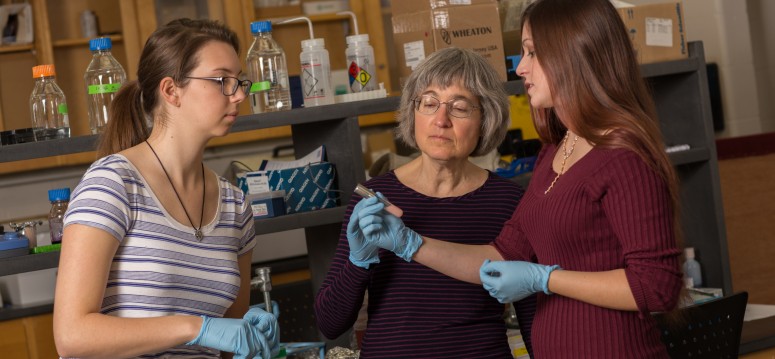Mars-ready Microbes

From Kenyon News - December 15, 2016
Karina Kunka ’19 and Jessie Griffith ’19 are conducting research at Kenyon that may help NASA grow microbes on Mars. If their lab work produces a microbe that grows under Mars-like conditions, it could give NASA clues to designing experiments that detect life on Mars.
“Further ahead, lab evolution could generate microbes that help Mars colonists form an ecosystem to support humans,” said Joan Slonczewski, Robert A. Oden Jr. Professor of Biology, who is mentoring the student researchers together with Dr. Shiladitya DasSarma, a colleague at the University of Maryland School of Medicine.
Kunka and Griffith, both molecular biology majors, started their research in the spring semester and continued it as Summer Science Scholars. A combination of a $5,000 NASA grant and matching funds from the College will pay for Kunka, from Moseley, Virginia, and Griffith, from Luckey, Ohio, to continue the study for nine weeks next summer in DasSarma’s lab.
“It was my hope and dream that this kind of lab research would happen,” Griffith said. “I am surprised that it happened so soon [in my career].”
A long-term experimental evolution of this particular strain of Halobacterium has never been done. The strain survives in extreme cold and at salinity levels higher than ocean water, and Griffith and Kunka are studying what changes will occur in the strain after they grow 500 generations of it under acidic conditions and iron stress. It takes about three days to grow one new generation of Halobacterium.
“We are still in the phase where these guys can be frustrating because they take longer to grow to an optimal density where we can measure them," Kunka said.
“Dr. S was with us through the whole process, all the way. She was a big, huge help,” Griffith said of Slonczewski’s guidance. Griffith and Kunka work in Slonczewski’s lab almost every day and often Skype with DasSarma to discuss their progress.
DasSarma, who has experience with this type of microbe, is helping Kunka and Griffith interpret the results of evolutionary changes in its genetic code, since the organism has more than a single chromosome on which mutations may occur.
Griffith and Kunka have been part of Slonczewski’s lab since their first semester at Kenyon, when Slonczewski hired them for her lab cleaning crew and integrated them into the research environment with upperclass students. Slonczewski’s lab focuses on the experimental evolution of E. coli across thousands of generations. Both Kunka and Griffith also have worked on Slonczewski’s E. coli experiments and have co-authored papers about those findings.
“Within two years, they have become accomplished scientists who mentor other students as well,” Slonczewski said.
Griffith works as a lead tutor for other students. “The spirit of collaboration gets passed down,” she said. Kunka is a teaching assistant in a biology lab class for first-years and sophomores. “Lab work is what I’m really interested in, so I want to help other people in the lab,” Kunka said.